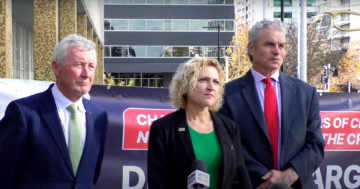
A whistleblower defence has proved to be of little use when tested in court, leaving a public servant facing 24 charges. Photo: File.
Australia’s current whistleblower protection laws have been tested in court and found to be no defence for public servants accused of high-level breaches.
Former Australian Taxation Office employee Richard Boyle has tested the decade-old laws in the South Australian District Court only to have the defence dismissed.
The whistleblower used the federal Public Interest Disclosure Act to ask for 23 of the 24 charges against him to be dropped, but his request was denied.
The reasons for the refusal remain suppressed.
Mr Boyle is charged with 24 counts over the release of protected information to the media about the ATO’s introduction of harsher debt-collection methods.
The ATO’s approach involved orders requiring banks to transfer funds from personal or business accounts without the permission of the taxpayers holding those accounts.
The hearings began in October last year and Mr Boyle now faces a Supreme Court trial and life in prison if found guilty.
But his legal team is considering an appeal against the interim order that threw out the whistleblower defence.
It was the first time the 2013 laws have been tested in court.
Mark Dreyfus was the attorney-general who introduced the laws then, and now as Attorney-General again wants further changes to increase whistleblower protections.
The amendments are before the Senate, with debate to start in May.
The Human Rights Law Centre is now urging the Federal Government to discontinue the prosecution of Mr Boyle and “fix whistleblower protection laws” immediately.
HRLC senior lawyer Kieran Pender said the recent court ruling was a blow for Australian democracy.
“When whistleblowers speak up about government wrongdoing, human rights violations and corporate misfeasance, they make Australia a better place,” he said.
“Our laws need to reflect that. This prosecution, and that of war crimes whistleblower David McBride, are unjust and undemocratic.
“The whistleblowing laws enacted by Mark Dreyfus when he was attorney-general in 2013 have now failed both men.
“There is no public interest in either prosecution and it is high time that Dreyfus intervened to drop both cases, just as he dropped the Collaery case.”
Mr McBride is being prosecuted for allegedly leaking documents to the ABC that informed a series on alleged war crimes in Afghanistan.
The Federal Government has wanted whistleblower laws strengthened in time for the new National Anti-Corruption Commission to start operating.
Justice Paul Brereton has been appointed commissioner of the NACC.
Justice Brereton, who is a Major General reserve officer in the Australian Army, led the inquiry into allegations of war crimes by Australian troops in Afghanistan and most recently served on the NSW Court of Appeal.
The NACC was established by Labor in response to what it said was declining trust in the government and public institutions by the Australian people.
Mr Dreyfus will not comment on the Boyle case as it is still before the courts.
But the Attorney-General has previously dismissed calls to use special ministerial powers to dismiss the case against Mr Boyle, saying it was not an exceptional circumstance case.
Those powers were used to end the case against Canberra lawyer Mr Collaery, who faced charges over the communicating of classified information in the Timor-Leste bugging scandal.
Mr Collaery has also called on Mr Dreyfus to drop the charges against Mr Boyle.




















